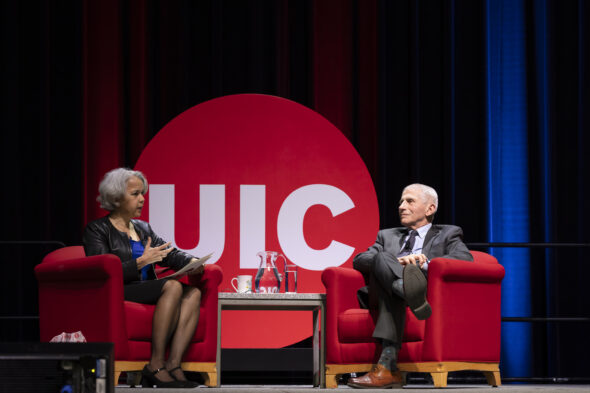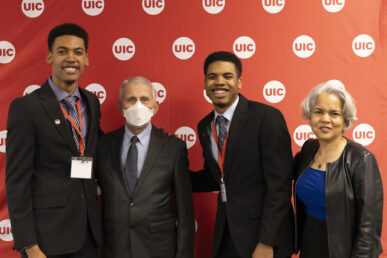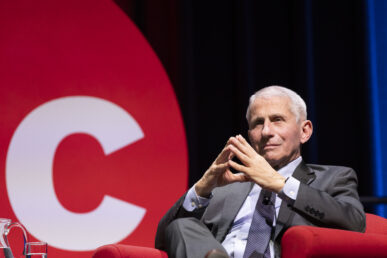First Chair Chats event brings Fauci to UIC

Dr. Anthony Fauci, a key adviser to seven U.S. presidents and former director of the National Institute of Allergy and Infectious Diseases for nearly four decades, said the University of Illinois Chicago is an example of an institution that’s helping to counter false information when it comes to science.
Fauci was at UIC Tuesday, Feb. 20, to take part in the inaugural Chair Chats. The series brings well-known leaders and influential visionaries to the UIC community to explore powerful ideas in public conversations with UIC Chancellor Marie Lynn Miranda.
As the country’s top infectious disease expert, Fauci helped lead the U.S. through the COVID-19 pandemic and was often targeted by people who disagreed with his approaches.
“We are living in an era of misinformation and disinformation at a level the likes of which I don’t think this country has seen, ever,” Fauci said. “The only way to counter misinformation and disinformation is to get the people who care about truth, integrity and the correct information to be actively out there talking about those things.”
Fauci pointed to UIC’s diverse student body and high proportion of students who are first-generation immigrants and the first in their families to go to college. These students look to higher education based on truth to pursue their goals of giving back to society, he said.
“You’re trying to and succeeding in educating younger individuals, and you’re doing it in a really optimal way … with a great degree of diversity, with a great degree of appreciation for the fact that there are many views in society,” Fauci said.
Miranda, who has known Fauci professionally for many years, invited him to take part in the first Chair Chats event. She asked him a range of questions submitted beforehand by students, faculty, staff and others, from his advice for young people to what he would have done differently while steering the nation’s response to the COVID-19 pandemic. Fauci will be awarded the Paul H. Douglas Award for ethics in government in March by the University of Illinois System for his work and writings.
Miranda started the conversation by discussing Fauci’s long history as a physician scientist and immunologist with the National Institute of Allergy and Infectious Diseases, where he was at the forefront of efforts to fight widespread diseases including HIV/AIDS, SARS, Ebola and COVID-19.
Fauci said his work with HIV/AIDS began when he was a young doctor in the summer of 1981. In June that year, he saw a weekly report from the U.S. Centers for Disease Control and Prevention that noted five young gay men in Los Angeles had a type of pneumonia that only appeared in immune-compromised people. It seemed like “a fluke,” Fauci said. But in another report a month later, that number had grown to 26 gay men in Los Angeles, San Francisco and New York.
At that point, Fauci said, he felt a compelling need “of empathy and scientific challenge all in one.” He felt compassion for the young men who were being stigmatized not only for being gay but for having a mysterious disease that was likely sexually transmitted. Many chose to ignore the disease because it largely affected the gay community, Fauci said.
“I felt an almost fundamental ethical responsibility to say I’m going to change the direction of my career and start studying this disease,” Fauci said. “To me it was kind of a moral responsibility because no one wanted to get involved in this strange disease.”
Fauci’s work with HIV/AIDS led to him spend countless hours with sick patients in the early years of the disease, and feedback from patients helped inform the development of treatments. By 2001, a patient could take a single pill containing three drugs and have a near-normal life expectancy.
“In 1981 when I was taking care of individuals, their life expectancy was 10 months,” Fauci said.
At the direction of former President George W. Bush in 2003, Fauci structured the U.S. President’s Emergency Plan for AIDS Relief program, known as PEPFAR, which prevented millions of HIV infections and treated millions of AIDS patients in sub-Saharan Africa.
About the COVID-19 pandemic, Fauci said decreased investment in local public health in many cities and locales over time left the country short on resources to battle the pandemic with isolation and contact tracing.

“Decades ago, we had a great local public health system,” Fauci said. But as the pool of public health workers shrank, funding fell short and we came to rely on better vaccines and antibiotics, “our otherwise really good local public health system fell apart.”
Asked what he would have done differently about the nation’s response to the pandemic, Fauci said COVID-19 was a “moving target,” requiring an evolving understanding of the virus.
“What society needs to understand is when scientists change their recommendations, that’s not flip-flopping. That’s what science is,” Fauci said.
Before the Chair Chats conversation, students had a chance to meet Fauci and take their photo with him.
The first student to meet him was Justin Banks, a senior studying integrated health. Banks said he is planning to pursue a career in the medical field.
“As someone who is working in the health care field and hoping to be as much of a change maker in health care as him, (it’s) really inspiring; it gives me hope,” Banks said of meeting Fauci.
Dana Franceschini, who is earning her doctorate degree in the Jane Addams College of Social Work, said her focus is on health care social work. She wanted to meet Fauci because of his impact both in the United States and around the world.
“I thanked him for everything he has done and wanted to make sure that he knows that he really is a role model and an inspiration for so many of us,” Franceschini said.

